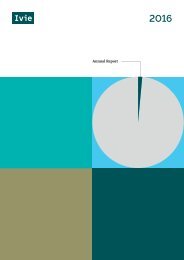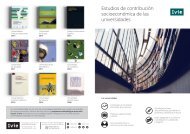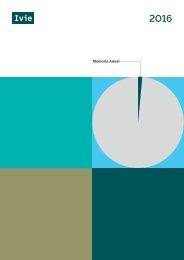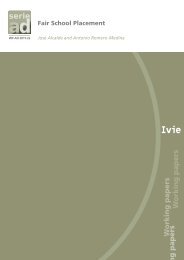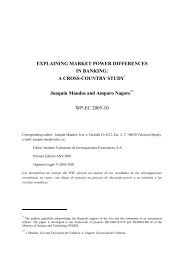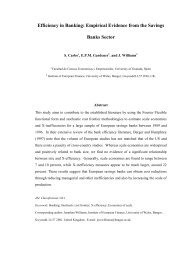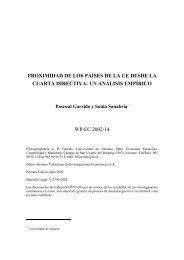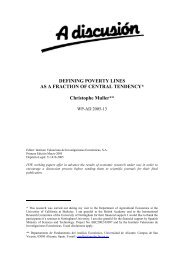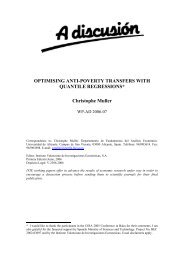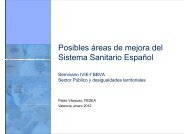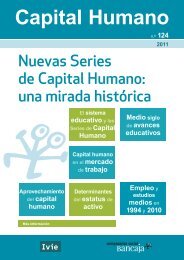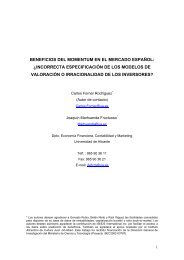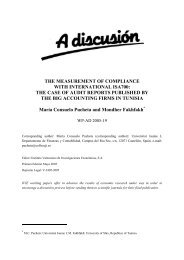You also want an ePaper? Increase the reach of your titles
YUMPU automatically turns print PDFs into web optimized ePapers that Google loves.
information by education levels on the number of students per year, the duration of studies and outcomes of<br />
education in terms of their effects on wages and the chance of employment among working-age persons<br />
(defined as employment against unemployment or inactivity).<br />
For the financial services area, during 2012 the <strong>Ivie</strong> team has continued to build the indicators that measure<br />
the banking output, the dependence on external financing and banks’ efficiency, competence and stability in<br />
the European Union. In addition, the degrees of integration, internationalization and openness of the financial<br />
sectors have been analyzed.<br />
In the health area, health capital for four countries (Spain, United Kingdom, Hungary and Germany) has been<br />
estimated in order to combine the measurement of output and productivity in the healthcare sector with that of<br />
the monetary valuations of the population’s health. In 2012, an international comparison of the performance of<br />
the healthcare sector, not available in the literature so far, was accomplished. The output generated by<br />
hospitals and other health centers was compared, as well as the endowments and features of the workers, and<br />
the growth of labour productivity for the four surveyed countries in the 2003-2009 period (2004-2008 for<br />
Germany). Also a study was carried out that analyzes equal opportunities using a methodology which expresses<br />
the gains made by the agents in ordered categorical data. This methodology is applied to the equal<br />
opportunities context in European countries in two different areas: education and health.<br />
Research team:<br />
Matilde Mas (<strong>Ivie</strong>, Universitat de València)<br />
Francisco J. Goerlich (<strong>Ivie</strong>, Universitat de València)<br />
Carmen Herrero (<strong>Ivie</strong>, Universidad de Alicante)<br />
Joaquín Maudos (<strong>Ivie</strong>, Universitat de València)<br />
José Manuel Pastor (<strong>Ivie</strong>, Universitat de València)<br />
Lorenzo Serrano (<strong>Ivie</strong>, Universitat de València)<br />
Juan Fernández de Guevara (<strong>Ivie</strong>, Universitat de València)<br />
Rodrigo Aragón (<strong>Ivie</strong>)<br />
Héctor García (<strong>Ivie</strong>)<br />
Laura Hernández (<strong>Ivie</strong>)<br />
Juan Pérez (<strong>Ivie</strong>)<br />
Jimena Salamanca (<strong>Ivie</strong>)<br />
Ángel Soler (<strong>Ivie</strong>, Universitat de València)<br />
Irene Zaera (<strong>Ivie</strong>)<br />
• ABACO (2011-2013)<br />
ABACO (Knowledge-Based Activities) is a joint project of the <strong>Ivie</strong> and the Campus of International Excellence<br />
(VLC/Campus), in collaboration with the COTEC Foundation and the Telefónica Foundation, which aims to<br />
become a national benchmark for the measurement and analysis of knowledge-based activities and to promote<br />
the recognition of its importance for Spain. The project has been commissioned by VLC/Campus and is<br />
organized around three elements in order to achieve the said goals: (i) the creation, through the ABACO<br />
website, of an open and accessible information system on all the relevant dimensions of knowledge-based<br />
activities, from a global and local perspective; (ii) the production, storage and dissemination of documents,<br />
<strong>report</strong>s, briefing notes, maps, and other audiovisual materials that analyze the trajectory of these activities in<br />
Spain, from multiple perspectives; (iii) and the encouragement of initiatives that aim to share opinions and<br />
views on the situation of the knowledge-based activities and, through them, promote knowledge-based<br />
competitiveness, growth and well-being.<br />
In 2012, the tasks carried out by the <strong>Ivie</strong> have been:<br />
⎯ The elaboration, presentation and opening to the public of the Observatory, a powerful data bank<br />
which offers users free access to over 200 indicators and is structured in five areas: new technologies,<br />
human capital, innovation, environment and socio-economic impact of knowledge-based activities.<br />
Research and economic studies 51



